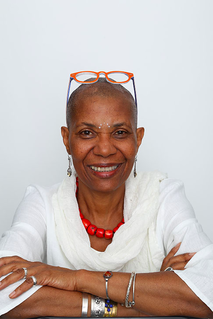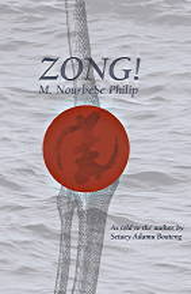 M. NourbeSe Philip M. NourbeSe Philip M. NourbeSe Philip will join us at Western University as the 2013-14 Writer-in-Residence in the Fall term. Guggenheim fellow, winner of a Toronto Arts Award, poet, fiction writer, essayist, dramatist and lawyer, M. NourbeSe Philip was born in Tobago and moved to Canada to attend Western University, where she graduated with a law degree in 1973. After seven years in practice, first at Parkdale Community Services and then in the partnership Jemmott and Philip, Philip left law in 1983 to devote her time to writing. Philip’s most recent book, Zong! (2008) is a book-length poem based on an eighteenth-century court case, Gregson vs. Gilbert, the only public document related to the lives and deaths of 150 Africans murdered for insurance money aboard the slave ship Zong. Fugal, fragmented, and deeply moving, Zong! has been adapted through multimedia performance, including a dramatized reading at Toronto Harbourfront as part of "rock.paper.sistahz" in April 2006. In 2012, Philip held a seven-hour interactive reading of the complete poem at b current studio space in Toronto while simultaneously, in Blomfontaine, South Africa, another audience held a collective reading. Philip’s other major works include the young adult novel Harriet’s Daughter (1988), her second novel Looking for Livingstone: An Odyssey of Silence (1991) and the groundbreaking and award-winning poetry collection She Tries Her Tongue, Her Silence Softly Breaks (1989), winner of the Casa de las Americas Prize in poetry. Author of four collections of essays, three additional collections of poetry, and two plays, Philip’s work spans and interweaves genres, attending to language in particular—her work is often noted for its deconstruction of grammar, while her newest poem engages legal language. Philip takes up themes of colonialism, race, memory, identity, and place, modeling the intersections of politics and poetics with her innovations on form. In her non-fiction work, Philip is a committed social critic, bringing her years of study in economics, political science and law to bear on Canadian social policy. Her poetry is included in the new collection, The Great Black North: Contemporary African-Canadian Poetry (Frontenac House, 2013). Biography by Nina Budabin McQuown RUSTY TALK WITH M. NORBESE PHILIP Scott Beckett: What is your first memory of writing creatively? M. NourbeSe Philip: My first memory of writing creatively was actually writing a piece about my fear of flying which was sparked by being on a plane with my very young son for the first time. I remember taking him to the washroom and him being so fascinated by the loud sucking noise of the toilet while all I could think of was what was on the other side of the toilet—space, nothingness. It was actually published in a traveller’s magazine whose name I now don’t remember. SB: How did you decide to become a writer? NP: The process was very gradual. I come from an island nation that was once a colony of the British Empire and, as a young child, lived through a very exciting time as the island moved towards independence. Part of the change was that for the first time there was universal secondary education and parents wanted what all parents want for their children—the best. This did not include becoming writers. There is an essay I wrote about this process of coming to writing, “The Absence of Writing or How I Almost Became a Spy,” in which I talk about reading a lot as a child, and I write something to this effect: “Books for so.” (The Caribbean vernacular for saying there were lots of books.) Other people were writing them, we were reading them. The mindset was that you wanted your child to be a lawyer or a doctor, failing that then a teacher or, perhaps, nurse, and if all else failed then a civil servant. Writing was not an option. It’s important to understand that for me writing wasn’t on my radar. I began writing poetry while I practised law, and even though I knew I wasn’t going to spend the rest of my life in law (I think I did law because my father wanted to be a lawyer and never did become one), I still didn’t think I would become a writer. But at some point I remember thinking maybe, just maybe, I’ve got something to say that someone might listen to. It was that tentative, for all those historical and cultural reasons. It certainly wasn’t a sort of Saul-on-the-way-to-Damascus type of epiphanic event. SB: What is your writing process like? Do you write in a certain place or time? Is it an everyday activity, or is it when the ideas come to you? NP: I like writing in the mornings and I try to do it—emphasis on the “try”—on a daily basis. I don’t always succeed. Having said that, however, I find myself “scribbling” every day. It might not necessarily be something that I’m thinking will be my next poem or my next novel or next play, but I am always aware that these scribbles could be useful. Periods of time will get more intense, of course, if there’s a project that is formed, or there is a piece of writing I feel I have to do—then it all becomes a lot more conscious and focused. But those “scribbles” are really important because they are scribbles. Often you may think that they’re not important but later on, you realize that they can be very helpful. It is the fact that they are scribbles and “not important” that makes them valuable—the untethered mind in free fall. SB: Has anything important come from these sessions of “scribbling?” NP: Yes, I have a sense that I have one more book of poetry and what I have in mind actually is based on those “scribbles.” SB: So that is what you’re working on right now? NP: Yes, or not working on, or un-working on. SB: Is there a piece that you’ve written that you are particularly fond of that you would consider to be your favourite? NP: It is like asking which of your children you like best. Different pieces for different reasons, but I’ll say Zong! right now, maybe because it is my most recent child, my youngest child. I’m saying that also because it is moving into areas that I have never ever ventured in to. My work has tended to be primarily page bound, as much poetry is, but this work is moving into performance or what I call unperformance or de-performance, and I’m really interested in that. SB: What is your advice to young writers? NP: At any point in time, there are at least two poems, two stories, two novels that are there: the one you think you want to write, the other, the one you have to get out of the way of to let it write itself through you. What I’m talking about is getting your ego out of the way to let what has to be written write itself through you. So writing then becomes an act of surrender and revelation to yourself. And ultimately to the reader.  M. NORBESE PHILIP'S MOST RECENT BOOK Zong!, Weslyan University Press and by The Mercury Press in Canada, 2008 Description from the Publisher: In November, 1781, the captain of the slave ship Zong ordered that some 150 Africans be murdered by drowning so that the ship’s owners could collect insurance monies. Relying entirely on the words of the legal decision Gregson vs Gilbert--the only extant public document related to the massacre of these African slaves--Zong! tells the story that cannot be told yet must be told. Equal parts song, moan, shout, oath, ululation, curse, and chant, Zong! excavates the legal text. Memory, history, and law collide and metamorphose into the poetics of the fragment. Through the innovative use of fugal and counterpointed repetition, Zong! becomes an anti-narrative lament that stretches the boundaries of the poetic form, haunting the spaces of forgetting and mourning the forgotten. Information on how to meet with NourbeSe Philip for London and Western folks: NourbeSe Philip will hold weekly office hours on Tuesdays and Wednesdays from 10:00 am to 5:00 pm, to offer feedback to, and consultation with, both experienced and novice creative writers from the university and the London community. She will accept works of poetry, fiction, creative non-fiction and drama. Scott Beckett is Western University's 2013-14 Student Writer-in Residence. Comments are closed.
|
Rusty Talk
Rusty Talk Editor: Archives
November 2017
Categories
All
|

 RSS Feed
RSS Feed
